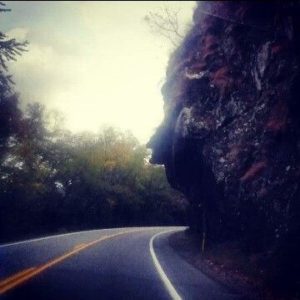
Malachi 3:1-4 ; Luke 3:1-6
Our youngest child, Henry, had some interesting ways of saying things when he was little. He soaked up information like a sponge, but sometimes his brain got a little ahead of his mouth and things came out funny. For example, he would tell you that our town of Bloomsburg sat along the banks of the Sexy-Hanna River. Also known as the Susquehanna River.
One day he and I were in the car driving along a road that was known locally as The Narrows, because it was a narrow, winding road with railroad tracks on one side and a straight, jagged rock wall on the other. Henry pointed toward the rocky wall and said to me, “You know why it’s like that? It’s because they daminated the mountain to make this road.” It took me a second to translate what he said from daminated to dynamited. For a moment we both marveled at the industrious nature of humankind. Then I wondered: maybe damination would be a better word for what they did to the mountain?
It’s along the same lines, it seems, as what John the Baptist was proposing. “Prepare the way of the Lord, make his paths straight. Every valley shall be filled, and every mountain and hill shall be made low, and the crooked shall be made straight, and the rough ways made smooth; and all flesh shall see the salvation of God.” But John is not talking about laying to waste the grandeur of God’s creation. I think John had other kinds of mountains and crooked ways in mind when he spoke these words. What could he have meant?
Where to begin? Luke nudges us in the right direction as he sets up this scene in the third chapter. Hear this:
“In the fifteenth year of the reign of Emperor Tiberius, when Pontius Pilate was governor of Judea, and Herod was ruler of Galilee, and his brother Philip ruler of the region of Ituraea and Trachonitis, and Lysanias ruler of Abilene, during the high priesthood of Annas and Caiaphas, the word of God came to John son of Zechariah in the wilderness.”
We might not know who all these people are – for that we can consult the history books – but we do know what they stand for: they are the movers and the shakers of the day. Picture this: Luke, the great first-century cinematographer; his camera pans over them all – the emperor, the governor, the rulers, and the high priests – we see them, and then they are gone, the camera moves on – and stops at last, focusing on a lone figure out in the wilderness, poorly dressed: John.
Wild and lone the prophet’s voice echoes through the desert still.
And here is what John is saying: turn around. Turn around; you have been looking the wrong way.
For isn’t it always the case that we look to the strong, the powerful, the influential ones? It is here we place all our admiration, our honor, our hope. Yet, Luke tells us, you are looking the wrong way, for God has chosen that crazy-looking guy out in the wilderness.
It is the way things have always been with God. God has always made the unexpected choice. Jacob, the quiet one chosen over the ruddy, outdoorsy Esau to be the father of Israel. David, the littlest one in a family of big strapping boys was chosen to be the king of Israel. God is always choosing the second-born over the first-born, the weak over the powerful, the poor over the wealthy. It is the way it has always been and, yet, it is a sign of new things to come. God is doing a new thing: God will come to us as one of us, and it will not be as a prince or a matinee idol: God will come to us in the midst of poverty and humility. If we are blinded by all that glitters, we might miss seeing him.
John has a message for us: He is coming; prepare the way.
He calls to us as the refiner’s fire, bidding us to come be refined and purified until we can see the way he sees.
For, just as God gave the word of repentance to the powerless man who stood at the margins of society, just as God came to earth as the poor, helpless infant, child of the oppressed, it is the same today: he is calling to us from the edges. We will see him in the faces of the least, the last, and the lost.
So let us turn around, look for our coming Lord, and prepare the way. Let us place our honor and our hope in the one who is both shepherd and lamb, let us give praise and glory to his name.
Awake, awake and greet the new morn, for angels herald its dawning. Sing out your joy, for soon he is born, behold! the child of our longing.
Photo: The Narrows
